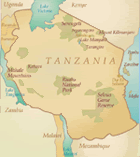The kids and I have excellent American health insurance – and we need it because health care in America costs a bloody fortune.
But not here in Tanzania.
Since we moved here we have been to the doctor many many times – as many if not more times than during Jaden and Rowan’s first year of life.
Between the three of us we have suffered from fevers, coughs, eye infections, allergies, diarrhea, stomach flues, and even hookworm. We’ve each had several malaria tests (since every time you - or especially your kids - have a fever you need to get tested right away) and (knock on wood) they have always come back negative.
I’ve had to fill prescriptions for antibiotics, decongestants, antihistamines, cough suppressants, de-worming medication, fever medicines, oral rehydration salts, and malaria treatment (to carry on safari as a precaution).
Our doctor went to Johns Hopkins University for an MPH – just the year before me.
We are well cared for here. I’ve never had to wait for an appointment for more than 10 minutes and I always can get an appointment within a few hours of calling the office. And if it is an emergency I can just walk right in. We are getting gold star service.
And I’ve never, not once, submitted an insurance claim form. Never.
Why?
We haven’t even come close to spending the $400 (the deductible) between the three of us.
An office visit costs $17.00
A malaria test costs $3.00
High-end antibiotics tips the scales at $20.00 for a 10-day course
De-worming medicine, to clear the worms from Rowan’s feet, costs $1.00
As long as we stay somewhat healthy we won’t in any given year need to fill in the insurance forms and wait for this or that procedure to be rejected.
I don’t want to sound like I’m bragging or anything, but I’m certain that we are getting better and more cost-effective health care than you are, just as long as nothing major goes wrong.
Keep your fingers crossed.
___________________________________________________________
You don’t need to point out to me that the care my family is getting is not the norm in Tanzania. Believe me. I know. Over the past year I have spent many hours visiting public health care services here – and trust me – it ain’t pretty.
Although Tanzania’s health care system likely works better than many other countries in sub-Saharan Africa, the situation on the ground is pretty hard to stomach.
Facilities are overcrowded. The waits are so long that sometimes patients have to come back the next day. Healthcare workers are poorly paid. And in fact – something like a full 25% of the nurses and doctors trained in Tanzania are currently working in other countries that pay better, like Botswana and Zambia.
Life saving, essential drugs are often stocked out. Tanzania has instituted cost-sharing, so that patients pay for at least some part of the value of drugs bought at public dispensaries. But it doesn’t much help to have cheep drugs when you can even get patients to use them. For example, there is a tremendous decrease in maternal and infant morbidity and mortality when pregnant women receive preemptive treatment for malaria – once early in their in their second trimester and once in third trimester. Unfortunately, the average first prenatal visit is around 22 weeks. (Remember – that’s the average – half the population comes later or not at all.) Providers sometimes provide the drug, sometimes they don’t. About 60% of women get the first treatment. Only about 22% get a second treatment. This represents a major opportunity lost.
And because malaria is now resistant to most drugs, the new “combination” treatments that do work cost 30-times the old treatment. This is money that many just cannot afford. So their child doesn’t get lifesaving treatment. Their child dies.
_________________________________________________________________
Is it any wonder given the cost of health care (we haven’t even factored in the financial costs of getting to the health services or the opportunity costs of leaving a job or the land for a day to go to the services) that people often turn to two other sources of health care – informal pharmacies called Duka la Dawas or traditional healers.
Outside of the big cities, Duka la Dawas are often dusty, dirty spots selling a few – often expired, often fake, often inappropriate drugs. There you can go and buy just four antibiotic pills – rather than the 20 you need – because that is all you can afford.
Let’s talk drug resistance…
Traditional healers are often the first stop choice for those in need of healing. I’ve even heard educated Tanzanians talk about illness being related to curses or punishment – and traditional healers have spells and potions that can help fight the hex.
Before you judge them, however, think about how often you’ve heard people in the West wonder (or even wondered yourself) if their illness was somehow a message from God, or karma, etc.
It isn’t any different.
__________________________________________________________________
I wish that everyone in Tanzania could afford the excellent $17.00 health care that the kids and I are getting.
_________________________________________________________________
I’m not sure how to end this blog. I don’t have a wrap up thought that will make you say, “ah ha, that brought it all together for me.”
I guess I just wanted to say that the world is totally unjust. Here I am reminded of that – and the value of good health care - every single day.
A board announcing the price of various medications at the Tandale Health Clinic in a "poor" area of Dar es Salaam.
Women waiting for antenatal services at the Tandale Health Clinic








 Jaden and Rowan
Jaden and Rowan






